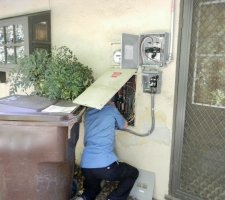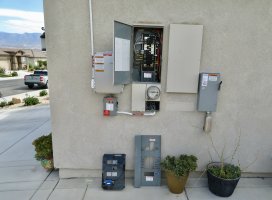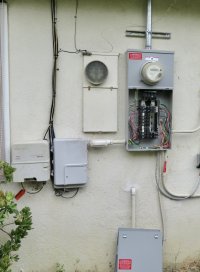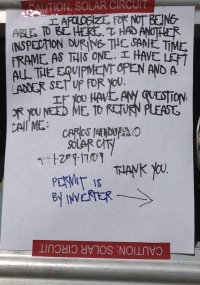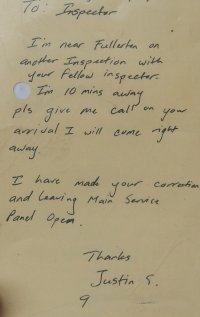jar546
CBO
After decades in the field, I've removed and replaced tens of thousands of electrical panel covers and thousands of dead fronts. With that volume of work, inevitably, things occasionally go awry. Power can be accidentally shut off, breakers might get knocked out of position, and yes, sometimes sparks fly.
One incident that stands out involved an electrician who had removed a panel cover for inspection. After I completed the inspection and asked him to replace the cover, a small arc flash occurred, and a circuit breaker blew. The cause? A wire had been pinched between the cover screw and the interior side of the panel. Had I been alone and removed the cover, I would have been responsible for repairing the wire and reconnecting the breaker.
This brings us to a longstanding debate: Should inspectors remove and replace panel covers when no qualified personnel are on-site? From both a personal and professional standpoint, my answer is no. It's the contractor's responsibility to ensure that work remains accessible and uncovered for inspection. Inspectors should carry tools like meters, flashlights, and cameras, not screwdrivers.
That said, I've occasionally bent this rule. There was a time I arrived at a home where an elderly lady was alone, preparing to leave for vacation. The inspection needed to be completed, so I removed the panel cover myself, despite my usual policy. I couldn't justify delaying her plans over a rule that, while grounded in safety, also requires some
common sense.
The core issues here are safety, liability, and workload for inspectors. In my jurisdiction, if no one is present and panel covers or dead fronts are still in place, the inspection fails due to noncompliance with FBC 110, which aligns with IBC and IRC 110. Moreover, inspections can't be conducted adequately if dead fronts remain installed; we've had instances where electricians removed the cover but left the dead front, necessitating its removal before proceeding.
I invite fellow professionals to share their experiences and thoughts on this matter. How do you handle situations where panel covers are in place and no qualified personnel are on-site? Have you faced similar dilemmas, and what policies have you implemented to address them?
Let's discuss and learn from each other's experiences.
One incident that stands out involved an electrician who had removed a panel cover for inspection. After I completed the inspection and asked him to replace the cover, a small arc flash occurred, and a circuit breaker blew. The cause? A wire had been pinched between the cover screw and the interior side of the panel. Had I been alone and removed the cover, I would have been responsible for repairing the wire and reconnecting the breaker.
This brings us to a longstanding debate: Should inspectors remove and replace panel covers when no qualified personnel are on-site? From both a personal and professional standpoint, my answer is no. It's the contractor's responsibility to ensure that work remains accessible and uncovered for inspection. Inspectors should carry tools like meters, flashlights, and cameras, not screwdrivers.
That said, I've occasionally bent this rule. There was a time I arrived at a home where an elderly lady was alone, preparing to leave for vacation. The inspection needed to be completed, so I removed the panel cover myself, despite my usual policy. I couldn't justify delaying her plans over a rule that, while grounded in safety, also requires some
common sense.
The core issues here are safety, liability, and workload for inspectors. In my jurisdiction, if no one is present and panel covers or dead fronts are still in place, the inspection fails due to noncompliance with FBC 110, which aligns with IBC and IRC 110. Moreover, inspections can't be conducted adequately if dead fronts remain installed; we've had instances where electricians removed the cover but left the dead front, necessitating its removal before proceeding.
I invite fellow professionals to share their experiences and thoughts on this matter. How do you handle situations where panel covers are in place and no qualified personnel are on-site? Have you faced similar dilemmas, and what policies have you implemented to address them?
Let's discuss and learn from each other's experiences.

